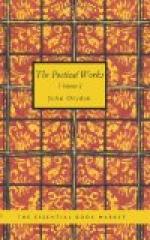By sea, by land, thy matchless worth was known, 840
Arms thy delight, and war was all thy own:
Thy force infused the fainting Tyrians propp’d;
And haughty Pharaoh found his fortune stopp’d.
O ancient honour! O unconquer’d hand,
Whom foes unpunish’d never could withstand!
But Israel was unworthy of his name;
Short is the date of all immoderate fame.
It looks as Heaven our ruin had design’d,
And durst not trust thy fortune and thy mind.
Now, free from earth, thy disencumber’d soul 850
Mounts up, and leaves behind the clouds and starry pole:
From thence thy kindred legions mayst thou bring,
To aid the guardian angel of thy king.
Here stop, my muse, here cease
thy painful flight:
No pinions can pursue immortal height:
Tell good Barzillai thou canst sing no
more,
And tell thy soul she should have fled
before:
Or fled she with his life, and left this
verse
To hang on her departed patron’s
hearse?
Now take thy steepy flight from heaven,
and see 860
If thou canst find on earth another he:
Another he would be too hard to find;
See then whom thou canst see not far behind.
Zadoc the priest, whom, shunning power
and place,
His lowly mind advanced to David’s
grace.
With him the Sagan of Jerusalem,
Of hospitable soul, and noble stem;
Him[71] of the western dome, whose weighty
sense
Flows in fit words and heavenly eloquence.
The prophets’ sons, by such example
led, 870
To learning and to loyalty were bred:
For colleges on bounteous kings depend,
And never rebel was to arts a friend.
To these succeed the pillars of the laws,
Who best can plead, and best can judge
a cause.
Next them a train of loyal peers ascend;
Sharp-judging Adriel, the Muses’
friend,
Himself a Muse: in Sanhedrim’s
debate
True to his prince, but not a slave of
state:
Whom David’s love with honours did
adorn, 880
That from his disobedient son were torn.
Jotham, of piercing wit, and pregnant
thought;
Endued by nature, and by learning taught
To move assemblies, who but only tried
The worse awhile, then chose the better
side:
Nor chose alone, but turn’d the
balance too,—
So much the weight of one brave man can
do.
Hushai, the friend of David in distress;
In public storms of manly steadfastness:
By foreign treaties he inform’d
his youth, 890
And join’d experience to his native
truth.
His frugal care supplied the wanting throne—
Frugal for that, but bounteous of his
own:
’Tis easy conduct when exchequers
flow;
But hard the task to manage well the low;
For sovereign power is too depress’d




